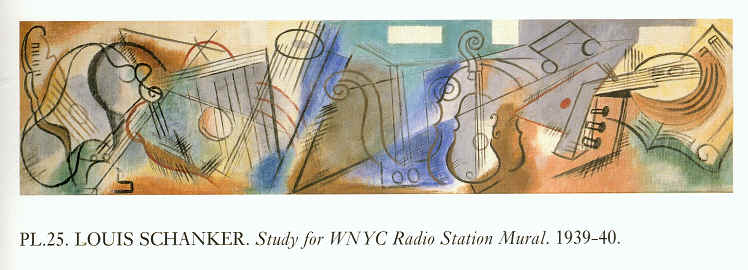

Schanker 1960's Duet wood block print 1937
Music in his Painting
The following quote is from an article/interview with Louis
Schanker, circa 1925, attributed to a
writer "H.C" (in the Smithsonian
Archives).
by visual means. This is not strange, for Mr. Louis Schanker
is endowed by nature with a
golden voice.
From early life he has sung and played the violin. Last year he was offered a
two year
scholarship from the Henry Street Music School. It was this award which caused
the
all around artist to reflect on the road that he should follow for his
future development.
Although genuinely
in love with his instrument, and eager to improve his naturally good voice,
he
truly realized that at last he had to make a choice. Without further hesitation he cast the
dice
and chose to forget for the time being all ambitions for a career as a baritone
and
concentrate solely on the art of painting.”
None has done greater justice to the musical element in
Schanker's painting than
Mr. Edward Alden Jewell. On the dedication of the artist's murals at the Municipal
Broadcasting Station,
in a long article
in the New York Times of August 6,
1939, Mr. Jewell said: "Though much of the four murals
dedicated last week
at WNYC is, in its present context, linked with music, Mr. Schanker's
alone has
been constructed manifestly on a basic musical motif, its abstract forms being
symbolic
of various instruments and notations. Attempted classification, in the
realm of modern abstract art
entails always an element of danger, so
controversial the whole thing has grown to be.Taking a
deep breath and plunging, this diver comes with the reckless
opinion that Mr. Schanker's abstract
idiom is of the
emotional type and the three others are cerebral. Upon the one hand, too, we have
an idiom that
is quasi-representational and upon the other hand we have an idiom that departs
entirely from representation at least from representation as commonly
understood..."
